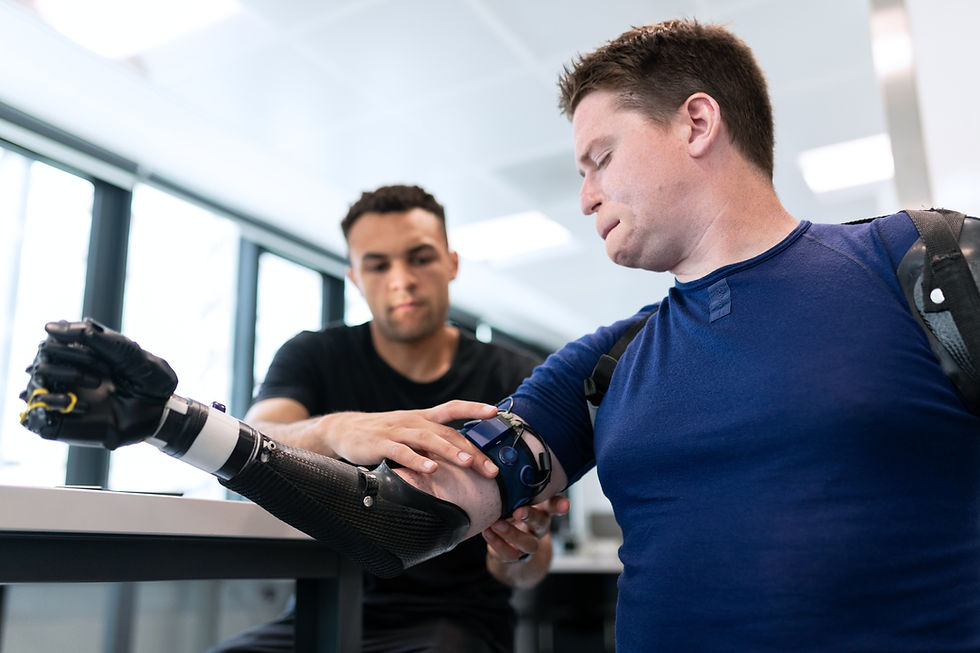The Rise of the Human Cyborg: Embracing the Futuristic Possibilities of Digital Enhancement
- Kat M

- Jan 9, 2024
- 4 min read

Step into the future. The age of the cyborg is upon us. Humans have been enhancing their physical abilities through technology since the dawn of civilization. But today, we're on the brink of a radical shift. We're not just talking about wearable tech here. We're talking about digital enhancement - the integration of technology into our very bodies.
Concepts that once seemed confined to the realm of science fiction are quickly becoming reality. Darth Vader, Robocop, even Oscar Pistorius, the “Blade Runner”, all part of pop culture's fascination with digital enhancement or robotic augmentation. However, this isn't just the stuff of movies and comic books. Real-life cyborgs walk among us.
In the last decade alone, we've seen dramatic advancements in digital enhancement technology. Tiny micro-sensors can now enable the human body to transmit data, using the natural electrical properties of the body. Imagine a future where you're digitally connected to your home heating devices. As you step into your home, the system detects your body temperature and adjusts the room's climate to suit your personal preference. Microsoft and Google are already making strides in this field.

The Potential of Digital Enhancement
The promise of digital enhancement is staggering. Advancements in this field have the potential to revolutionize the way we live, work, and interact with the world. The potential benefits for individuals and society are immense. Imagine a world where physical disabilities and limitations are things of the past. Or a society where we can improve our cognitive abilities, extend our lifespans, and augment our sensory perceptions.
The possibilities for the future of digital enhancement are thrilling. We could see the development of devices that allow us to interface directly with machines, bypassing the need for traditional computer interfaces. We might even develop the ability to upload our minds to digital storage, effectively achieving immortality. While these ideas may seem farfetched now, they're being seriously considered by scientists and engineers around the world.
But with these exciting possibilities come grave ethical considerations. As we push the boundaries of what it means to be human, we must also confront difficult questions about identity, privacy, and the potential misuse of these technologies.
Ethical Considerations
The moral implications of digital enhancement are complex and multifaceted. Technology that can improve our lives can also be used to harm or control us. Who gets access to these enhancements? Who decides what is a "normal" human capability? These are deep questions with no easy answers.
When it comes to the debate between enhancing versus altering human abilities, things get even murkier. Should we view enhanced humans as a new species or just as a subset of humanity? How do we ensure that the benefits of these technologies are distributed fairly across society?
Privacy and security concerns are paramount. Our body is our most intimate and personal space. The thought of integrating digital devices into our bodies surely stirs fears of surveillance, control, and the loss of privacy.

Real-Life Applications of Digital Enhancement: A Closer Look
The prosthetic legs of a Paralympic by U.S. Department of Defense is licensed under CC-CC0 1.0
Medical Advancements and Prosthetics
We've been using technology to replace or enhance parts of our bodies for centuries. From eyeglasses and hearing aids to prosthetic limbs and pacemakers, these advancements have transformed lives. And with the rise of digital enhancements, we're set to take this evolution a step further.
Impact on the Workplace
Digital enhancement has the potential to revolutionize the workplace. Imagine workers with enhanced cognitive abilities, or laborers with robotic limbs that dramatically increase their strength and stamina. The implications for productivity and efficiency are profound.
Potential for Improving Physical and Mental Disabilities
Digital enhancements hold great promise for those with physical and mental disabilities. These technologies could offer new avenues for communication, mobility, and independence, fundamentally altering the lives of millions of people around the world.

The Human Element
But amidst all this excitement, it's crucial not to lose sight of the human element. Technology is a tool, not an end in itself. As we integrate digital enhancements into our bodies, we must ensure that we maintain our humanity. We must balance our physical existence with our digital one, and never lose sight of the fact that it's our human qualities – our emotions, our creativity, our social interactions – that truly define us.
In a world increasingly dominated by technology, it's all too easy to lose touch with what makes us human. Our society is already grappling with the consequences of our reliance on digital technology. Texting has replaced face-to-face conversation, video games have supplanted outdoor play, and many of us feel more comfortable interacting with a screen than with a human being. As we move forward with digital enhancement, we must strive to maintain our human connections.
Whether we like it or not, technology is reshaping our world. Digital enhancement represents the next chapter in this ongoing evolution. But as we embrace the possibilities of the digital age, we must also grapple with its challenges. Will we become more human, or less? Only time will tell.
The Role of Government and Regulations
As with any new technology, digital enhancement poses many legal and regulatory challenges. Current laws and regulations surrounding this topic are evolving but still lack the specificity needed to address this rapidly advancing field.
There are growing calls for stricter regulations and ethical guidelines to govern the use and development of digital enhancement technologies. Policymakers must balance the need for innovation with the need to protect individuals and society from potential harms.
Balancing innovation with responsibility is a tricky but essential task. The potential benefits of digital enhancement are enormous, but so too are the risks. Ensuring that these technologies are developed and used responsibly should be a priority for all stakeholders.

As we journey into the future, we must navigate the complex and exciting world of digital enhancement with care and caution. While these technologies hold tremendous promise, they also present profound ethical and societal challenges. But one thing's for sure: the age of the cyborg is here, and it's set to change everything.
Personally, I find the prospect of becoming digitally enhanced both thrilling and terrifying. While I can imagine the benefits, I also fear the loss of my humanity. But then again, maybe that's the point. Maybe the future belongs to those who can embrace change without fear, who can adapt and evolve while holding fast to what makes us.



Comments